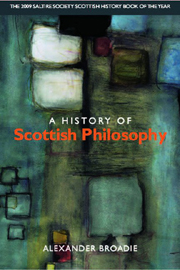Book contents
- Frontmatter
- Contents
- Acknowledgements
- 1 Introduction
- 2 John Duns Scotus
- 3 The Fifteenth Century
- 4 The Circle of John Mair
- 5 Humanism and After
- 6 Scotland Moves into the Age of Enlightenment
- 7 David Hume
- 8 Adam Smith
- 9 The Scottish School of Common Sense Philosophy
- 10 The Nineteenth Century: Ferrier to Seth
- 11 Realism and Idealism: Some Twentieth-century Narratives
- 12 Conclusion
- Bibliography
- Index
12 - Conclusion
Published online by Cambridge University Press: 12 September 2012
- Frontmatter
- Contents
- Acknowledgements
- 1 Introduction
- 2 John Duns Scotus
- 3 The Fifteenth Century
- 4 The Circle of John Mair
- 5 Humanism and After
- 6 Scotland Moves into the Age of Enlightenment
- 7 David Hume
- 8 Adam Smith
- 9 The Scottish School of Common Sense Philosophy
- 10 The Nineteenth Century: Ferrier to Seth
- 11 Realism and Idealism: Some Twentieth-century Narratives
- 12 Conclusion
- Bibliography
- Index
Summary
As this book demonstrates, there has been a long tradition of philosophising in Scotland. Though the first great Scottish philosopher, John Duns Scotus, educated in the Scottish Borders until the age of about twelve, pursued his philosophical and theological studies furth of Scotland partly because there was no university here, during the fifteenth century three Scottish universities were founded, at St Andrews, Glasgow and Aberdeen, and philosophy figured high on the agenda of all of them. By the end of the sixteenth century, with the foundation of Edinburgh University and Marischal College, Aberdeen, the country had brought its tally of universities to five, an impressive number in a country of one million inhabitants.
All five universities had a strong international dimension. At the start their internationalism was a necessity, for in order to have teaching staff the universities had to recruit Scots who had gone abroad for their education. In those earliest centuries the chief source of Scottish recruits was Paris, Scotus's university, which in due course was attended by Lawrence of Lindores, John Ireland, James Liddell, John Mair, George Lokert, William Manderston, George Buchanan, William Cranston; it is a formidable list. The outcome of the recruitment process was entirely to Scotland's benefit, since the country's high culture came to be served by men who had been educated at as high a level as was available anywhere, who had lively, creative imaginations, deep learning, and an awareness of what was taking place at the cutting edge of the various academic disciplines.
- Type
- Chapter
- Information
- A History of Scottish Philosophy , pp. 365 - 369Publisher: Edinburgh University PressPrint publication year: 2008



